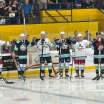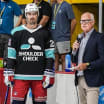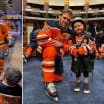Editor’s note: Last July, Brian Compton, the managing editor/days at NHL.com was diagnosed with multiple sclerosis. It was stunning news for Brian, who has worked at the League since 2007. Here, in a personal essay for NHL.com, Brian shares the details of his diagnosis, how friends, family and colleagues responded to the news, and how everyone and anyone can help him and all those dealing with this disease:
NHL.com editor shares story of MS diagnosis, fight in special essay
Brian Compton will be walking for a cure on May 17
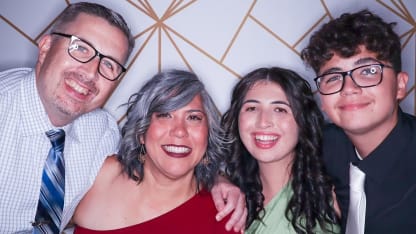
© Brian Compton
WANTAGH, N.Y. -- “You look great.”
It’s the most common compliment I receive since my life-changing event 10 months ago.
It was the week leading into Father’s Day last year when I started to not feel myself. The first symptom I experienced was double vision. I didn’t think much of it because my eyes have been a bit wonky for the majority of my adult life (I had cataract surgery for the first time when I was 30 -- true story).
That was Monday. Sitting at my desk here at the National Hockey League that Wednesday, I really started to feel off. Walking around the office, it felt as though someone was performing the Heimlich maneuver on me and not letting go.
“This is weird,” I thought to myself.
My normal weekend here at NHL.com is Thursday-Friday, so I figured I’d just get through the rest of my shift. I’d be fine by Saturday.
But by the time Friday rolled around, I had trouble breathing. I was 46, so maybe this was a heart attack?
It was time to go to the emergency room. I was scared.
My wife accompanied me to our nearby hospital where they began running tests, including an EKG.
“Nope, your heart’s fine,” they told me.
Phew.
So, what the heck is going on here?
“Let’s do a CAT scan.”
Um, OK.
I had that exam and waited a bit before the Emergency Department doctor on duty returned.
“Did you know you had a stroke at some point?”
What?
He informed me the lesion wasn’t new, so it wasn’t anything that happened recently.
“We’re going to keep you overnight and do an MRI in the morning,” he said.
A nurse woke me up around 6 a.m. Saturday and wheeled me down to the testing room. Headphones on in the tube, listening to classic rock, interrupted by loud beeps every few seconds.
My wife had stayed with our two teenagers at home Friday night and was back in my hospital room around 10 a.m. We waited together for a doctor to swing by and tell me I was fine and it was OK to go home.
Roughly two hours later, a neurologist walked in.
“Mr. Compton, you have lesions on your brain,” he told me. “I believe it’s multiple sclerosis.”
My only response was a blank stare. My wife started to cry.
Before they released me from the hospital, I called our Editor-in-Chief, Bill Price, who was in Edmonton for the Stanley Cup Final. He knew I was in the hospital but just like me was waiting to hear that I was OK. I was composed until shortly after I spilled the words.
“They found lesions on my brain, they think it’s MS,” I told him.
“I’m so sorry, man,” he responded. “We love you and we’re here for you, whatever you need.”
He thought the call dropped because I hadn’t responded. I couldn’t -- I was too busy sobbing uncontrollably.
“This is a lot,” I managed to eventually get out.
With my colleagues here at the NHL aware of my situation, one reached out and connected me with a family member who also has MS. I was grateful. It’s one thing to receive support from family and friends, but I needed to speak with someone going through it.
We spoke for nearly 30 minutes. He’s about my age and has been living with MS for almost 20 years. He told me exactly what I needed to hear.
“The first thing you need to know is you’re going to be OK,” he told me.
Deep breath.
Before our conversation ended, I was in tears again. I explained how I have a 19-year-old daughter and wondered even if I was physically present, would I be able to walk her down the aisle one day? What about my 15-year-old son? Will I be there for him?
“You absolutely will,” he assured me.
After another battery of tests over the next few weeks, I was officially diagnosed with Relapsing-Remitting Multiple Sclerosis (RRMS) in mid-July and began a monthly treatment in August designed to slow the disease’s progression. My neurologist informed me 10-15 years ago there wasn’t much help available in terms of treatment, but things have drastically improved in that area since.
Between modern medicine and some life changes, I’m living the best life possible. Spending time on a treadmill has become part of my daily routine. I’ve changed my diet for the better. With the weather getting warmer here in New York, I go for walks and try to clear my head (rarely with much success, but it’s worth a shot).
But I still get to do what I love -- I come to work for the NHL every day. Next month will conclude my 18th season. I should be able to come up with the words in this space to describe what the support from the League has meant and continues to mean to me, but no such luck.
Of course, I have good days and bad days, but I’m the only one who can tell the difference (at least that’s what I tell myself – my wife’s intuition is pretty remarkable). On the outside I look fine (that’s where the “You look great” comes in), but inside my brain is sending mixed messages to my immune system. My left leg is consistently heavy, stiff or tingling. I occasionally deal with sharp pains in my right hand. And there are some days when I’m incredibly moody and/or just too tired to do anything.
It's a learning process both for me and my family. Fortunately, I have the best there is.
On May 17, I will be participating in my first Walk MS event. I’ll be one of roughly 1,500 people at Jones Beach with the hope of helping the National Multiple Sclerosis Society achieve its goal of raising $500,000. The MS Society has funded more than $1 billion in research and has made more breakthroughs for MS than any other neurological disease. It hosts more than 200 Walk MS events across the United States and hopes to raise $30 million this year alone.
The amount of people in the corner of those like me provide hope there will be a cure in the not-too-distant future. Until then, our fight to look and feel great continues.
To contribute to Brian Compton’s first Walk MS, click here:
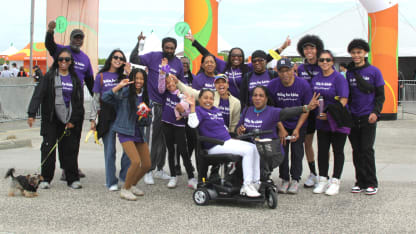
© Courtesy of National Multiple Sclerosis Society









